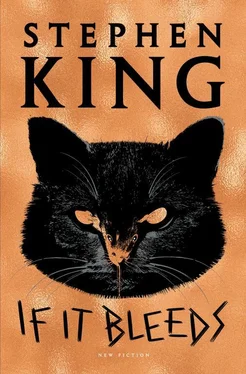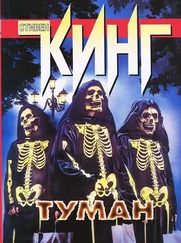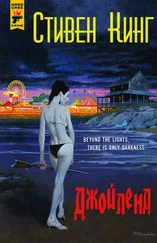“Jesus,” Drew said. “That’s terrible.” And it was. Bill Colson had been a nice man, soft-spoken, always combed and tucked in and smelling of Old Spice, always careful to tell Drew’s pop—and later, Drew himself—when something needed repairs, and just how much it would cost.
“Ayuh, ayuh, and if you didn’t know that, I don’t s’pose you know he done it in the dooryard of your cabin.”
Drew stared. “Are you kidding?”
“Wouldn’t kid about…” The bandanna appeared, more damp and bedraggled than ever. DeWitt sneezed into it. “…about a thing like that. Yessir. Parked his pickup, put the barrel of his .30-30 under his chin, and pulled the trigger. Bullet went right through and broke the back winda. Constable Griggs was standin right where you are now when he told me.”
“Christ,” Drew said, and in his mind, something changed. Instead of holding his pistol to the dancehall girl’s temple, Andy Prescott—the wastrel son—was now holding it beneath her chin… and when he pulled the trigger, the bullet would exit the back of her skull and break the mirror behind the bar. Using this elderly gore-crow’s story of Old Bill’s death in his own story had an undoubted element of expediency, even strip-mining, but that wouldn’t stop him. It was too good.
“Lousy thing, all right,” DeWitt said. He was trying to sound sad, maybe even philosophical, but there was an unmistakable twinkle in his voice. He also knew when something was too good, Drew thought. “But you know he was Old Bill right to the very end.”
“Meaning what?”
“Meaning he made his mess in the truck, not in Buzzy’s cabin. He’d never do a thing like that, at least not while he still had some of his right mind left.” He began to hitch and snort again, and scrambled for the bandanna, but this time was a little late to catch all of the sneeze. Which was a juicy one. “He caretook that place, don’tcha see?”
7
Five miles north of the Big 90, the tar gave out. After five more miles on oiled hardpan, Drew came to a fork in the road. He bore left, onto rough gravel that thumped and pinged off the Suburban’s undercarriage. This was Shithouse Road, unchanged, so far as he could tell, since his childhood. Twice he had to slow to two or three miles an hour in order to waddle the Suburban across washouts where culverts had indeed been plugged in the spring runoffs. Twice more he had to stop, get out, and move fallen trees off the road. Luckily they were birches, and light. One broke apart in his hands.
He came to the Cullum camp—deserted, boarded up, the driveway chained off—and then began counting phone-and-power poles, just as he and Ricky had as kids. A few were leaning drunkenly to starboard or port, but there were still exactly sixty-six between the Cullum camp and the overgrown driveway—also chained off—with the sign out front that Lucy had made when the kids were small: CHEZ LARSON. Beyond this driveway, he knew, were seventeen more poles, ending at the Farrington camp on the shore of Agelbemoo Lake.
Beyond the Farringtons’ place lay a huge swath of unelectrified wilderness, at least a hundred miles on either side of the Canadian border. Sometimes he and Ricky had gone up to look at what they called Last Pole. It held a kind of fascination for them. Beyond that one there was nothing to hold back the night. Drew had once taken Stacey and Brandon to look at Last Pole, and Drew had not missed the so what expression that passed between them. They assumed electricity—not to mention Wi-Fi—went on forever.
He got out of the Suburban and unlocked the chain, having to push and diddle the key before it would finally turn. He should have gotten some 3-in-1 at the store, but you couldn’t think of everything.
The driveway was almost a quarter of a mile long, with branches brushing at the sides and roof of the Suburban the whole way. Overhead were the two lines for the electric and the phone. He remembered them being taut back in the old days, but now they sagged along the diagonal Northern Maine Power cut running in from the road.
He came to the cabin. It looked desolate, forgotten. The green paint was peeling away with no Bill Colson to refresh it, the galvanized steel roof was drifted with fir needles and fallen leaves, and the satellite dish on the roof (its cup also filled with leaves and needles) looked like a joke out here in the woods. He wondered if Luce had been paying the monthly charge on the dish as well as the phone. If so, it was probably money for nothing, because he doubted if it still worked. He also doubted that DirecTV would send the check back with a note saying whoops, we are returning your payment because your dish has shit the bed . The porch was weatherbeaten but appeared sturdy enough (although it wouldn’t do to take that for granted). Beneath it he could see a faded green tarp covering what Drew assumed was a cord or two of wood—maybe the last wood Old Bill had ever brought in.
He got out and stood by the Suburban, one hand on the warm hood. Somewhere a crow cawed. Distant, another crow answered. Other than the babble of Godfrey Brook on its way to the lake, those were the only sounds.
Drew wondered if he was parked on the very spot where Bill Colson had parked his own four-wheel drive and blown his brains out. Wasn’t there a school of thought—maybe back in medieval England—that the ghosts of suicides were forced to remain in the places where they had ended their lives?
He started for the cabin, telling himself (scolding himself) that he was too old for campfire stories, when he heard something blundering toward him. What emerged from the screening pines between the cabin’s clearing and the brook wasn’t a ghost or a zombie apparition but a moose calf tottering on absurdly long legs. It came as far as the little equipment shed beside the house, then saw him and stopped. They stared at each other, Drew thinking that moose—whether young or full-grown—were among God’s ugliest and most unlikely creatures, the calf thinking who knew what.
“No harm here, bud,” Drew said softly, and the calf pricked its ears.
Now came more crashing and blundering, much louder, and the calf’s mother shouldered her way through the trees. A branch fell on her neck and she shook it away. She stared at Drew, lowered her head, and pawed at the ground. Her ears went back and lay flat against her head.
It means to charge me , Drew thought. It sees me as a threat to her baby, and it means to charge me.
He thought of running for the Suburban, but it might be—probably was—too far. And running, even away from the calf, might set the mother off. So he simply stood where he was, trying to send soothing thoughts to the thousand-pound creature no more than thirty yards away. Nothing to worry about here, moms, I’m harmless.
She considered him for maybe fifteen seconds, head lowered and one hoof pawing the ground. It seemed longer. Then she went to her calf (never taking her eyes from the interloper) and put herself between it and Drew. She gave him another long look, seeming to debate her next move. Drew stood motionless. He was badly frightened, but also weirdly exalted. He thought, If she charges me from this distance, I’m either going to be dead or so badly hurt I’ll probably die anyway. If she doesn’t, I’m going to do brilliant work here. Brilliant.
He knew it was a false equivalency even at this moment, with his life at risk—he might as well have been a child believing he would get a bike for his birthday if a certain cloud blotted out the sun—but at the same time he felt it was absolutely true.
Moose Mom suddenly swung her head, butting the calf in the hindquarters. It gave an almost sheeplike cry, nothing like the hoarse blat of Pop’s old moose-call, and trotted toward the woods. The mom followed, pausing to give Drew one final, baleful look: follow me and die.
Читать дальше








